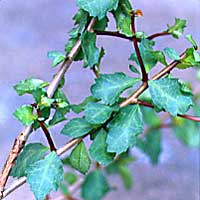Search Healthnotes
Guggul
 © Martin Wall
© Martin WallParts Used & Where Grown
The mukul myrrh (Commiphora mukul) tree is a small, thorny plant distributed throughout India. Guggul and gum guggulu are the names given to a yellowish resin produced by the stem of the plant. This resin has been used historically and is also the source of modern extracts of guggul.
- Reliable and relatively consistent scientific data showing a substantial health benefit.
- Contradictory, insufficient, or preliminary studies suggesting a health benefit or minimal health benefit.
- For an herb, supported by traditional use but minimal or no scientific evidence. For a supplement, little scientific support.
Our proprietary “Star-Rating” system was developed to help you easily understand the amount of scientific support behind each supplement in relation to a specific health condition. While there is no way to predict whether a vitamin, mineral, or herb will successfully treat or prevent associated health conditions, our unique ratings tell you how well these supplements are understood by the medical community, and whether studies have found them to be effective for other people.
For over a decade, our team has combed through thousands of research articles published in reputable journals. To help you make educated decisions, and to better understand controversial or confusing supplements, our medical experts have digested the science into these three easy-to-follow ratings. We hope this provides you with a helpful resource to make informed decisions towards your health and well-being.
This supplement has been used in connection with the following health conditions:
| Used for | Amount | Why |
|---|---|---|
High Triglycerides | 25 mg guggulsterones three times per day | Clinical trials indicate that guggul is effective in treating high triglycerides, in one trial, serum triglycerides fell by 30.3%. |
Acne Vulgaris | 500 mg extract twice per day | A controlled trial found that guggul (Commiphora mukul) compared favorably to tetracycline in treating cystic acne. |
High Cholesterol | 500 to 2,000 mg three times per day | Findings regarding the ability of guggul extracts to lower cholesterol levels are mixed. |
Osteoarthritis | 500 mg of a concentrated extract (3.5% guggulsterones) three times per day | In one trial, supplementing with guggul significantly improved symptoms in people with osteoarthritis of the knee. |
Obesity | 500 mg of an extract standardized to contain 5% guggulsterones three times per day | Limited evidence suggests guggul extract may improve metabolic health, lower cholesterol levels, and support weight loss. |
Traditional Use (May Not Be Supported by Scientific Studies)
The classical treatise on Ayurvedic medicine, Sushrita Samhita, describes the use of guggul for a wide variety of conditions, including rheumatism and obesity. One of its primary indications was a condition known as medoroga. This ancient diagnosis is similar to the modern description of atherosclerosis. Standardized guggul extracts are approved in India for lowering elevated serum cholesterol and triglyceride levels.
Copyright © 2026 TraceGains, Inc. All rights reserved.
Learn more about TraceGains, the company.
The information presented by TraceGains is for informational purposes only. It is based on scientific studies (human, animal, or in vitro), clinical experience, or traditional usage as cited in each article. The results reported may not necessarily occur in all individuals. Self-treatment is not recommended for life-threatening conditions that require medical treatment under a doctor's care. For many of the conditions discussed, treatment with prescription or over the counter medication is also available. Consult your doctor, practitioner, and/or pharmacist for any health problem and before using any supplements or before making any changes in prescribed medications. Information expires December 2026.









